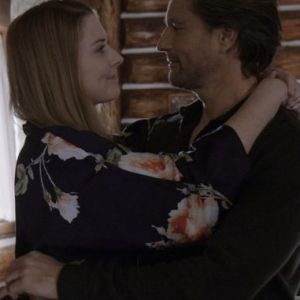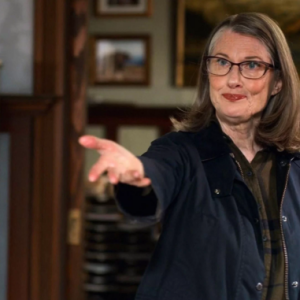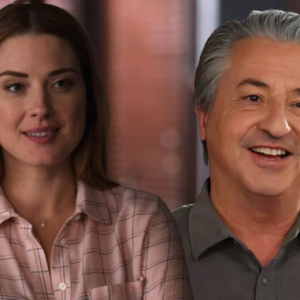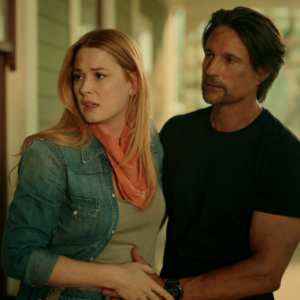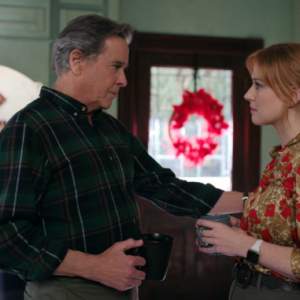Patrick Sean Smith is a fan. The writer for the next season of Netflix’s smash hit “Virgin River” is new to the job.
But he’s been watching faithfully, noting every turn in the episodic show twistier than its famous river.
And he takes his part very seriously. As he says, entering Season 5 as “the new guy,” Smith is “looking at what resonates
so successfully with so many people and making sure that I hit those marks.”
And what marks they are. The most recent season had over 87 million hours of viewing time the week of July 25 alone. It’s been in the top slot on Netflix since the new season premiered. After a brief dethroning by the limited series “Keep Breathing,” it’s No. 1 again.
Smith has come onto a show where the fans are devoted and the plotlines both convoluted and compulsively watchable. At the end of Season 4: everybody’s still pregnant, but not necessarily impregnated by the people we expect. Hope’s dealing with a difficult diagnosis and her surprise, sort-of grandson is dealing with one of his own too. The new guy may be out or our beloved heroine Mel may be out (probably not though). And Jack is drinking. Again.
Meanwhile, something is happening with the drug-running logging camp involving treachery, cash and threats (that storyline is more thorny and difficult to follow than the hike out of the woods). The man who assaulted Brie is back in her life, without her permission. And Preacher is once again saving everybody’s existence while also feeding them delicious, somehow healthy meals from Jack’s Bar.
Smith, a writer for “Dolly Parton’s Heartstrings” and the creator of “Greek,” understands the weight of his role in the beloved series, adapted from the novels by Robyn Carr: “I want to do right by the show and its fans.”
He spoke to Salon on the set of his new job in the midst of filming the next season of “Virgin River,” ducking into a trailer to escape the heat of Vancouver, which stands in for Northern California on the show. “We’re in it now,” he says, “but I’m excited for everybody to see it.”
“Virgin River” is loved by so many people, including my mom. She’s excited that I’m talking with you. What do you think makes the show so appealing? What do you think makes it loved?
I think it’s a really interesting blend of things. I think in the beginning: the fact that it wasn’t dark. That it’s hopeful. That it’s gentle in its storytelling. That it’s thoughtful. That it is timely. That it also doesn’t forget the importance of twists, surprises and cliffhangers, and kind of the fun popcorn element that you want with entertainment, that people get excited about. I think a lot of people see it as a sort of straightforward character drama, but I think it’s really unique in all the elements it has that you have to sustain.
One of the things that I love about it is community. Just that the town is so vivid and loving and supportive. Few shows have that now, I feel. How do you create that sense of real community?
It’s inspiring just by seeing it already in the cast. I know it seems like the cliche of everybody’s like a family, but there is such a closeness in this cast that I think is rare and special. That translates to the chemistry that they all have on screen.
With so much that’s seemingly fractured in our world today, to be able to watch people get along and support each other and challenge each other, and then also to love each other — I talked to somebody and they said: I hate to admit it, but I watched the show and it just makes me feel good. And I was like, that shouldn’t be controversial. We shouldn’t look at entertainment and feel bad because something is about community or is about loss or grief or love and think: going darker is better.
And the idea of the community: I grew up in a small town, so I’ve kind of had that experience. But the thing that I also appreciate about the show is that, some shows about small towns go quirky or go whimsical. Even with the kind of grittier crime stories that I think keep the show timely, the show feels real. They feel like real people. It feels like a town that you would drive through. You would stop at a place like Jack’s Bar and these are the people that you would see there. [The show] never tries to be cloying or like it has to present a small town in a way for it to be acceptable to a mass audience, which is: something that is cute and funny.
You mentioned some of the grittier storylines. There’s a lot of trauma in “Virgin River” and some of it’s very unrealistic and some of it is actually very real: Jack’s PTSD from being a combat veteran and Brie’s PTSD, from sexual assault. As a writer, how do you handle those storylines?
Respectfully and responsibly. We do our research. We reach out to organizations that offer resou

rces. And there are so many out there. Any form of entertainment, if they’re not reaching out for the sake of authenticity,they’re missing out on an incredible resource.
With Brie’s storyline, we’re working with RAINN specifically, and they’ve been incredibly insightful as to what her experience would be. I think our approach to writing the show is when it comes to something like that, if we haven’t had it, how do we presume to be able to tell it fairly and accurately? So, to work in concert with an organization [whose] goal is to help survivors and through storytelling, help them to see their stories accurately, is a great opportunity.
With PTSD and people in the military, we work really really hard to do all of our homework. Even some scripts, they’ll go through three, four, five different organizations . . . and also, as we’re coming up with the stories, we use [organizations] as a resource.
It’s also important that those storylines aren’t dropped, that they’re an ongoing issue for characters as they would be in life. They keep coming back for Brie and for Jack.
place, that we’re not exploiting it for the sake of entertainment, but really trying to tell these stories with respect and with a sense of responsibility . . . We have such a profound medium, and assuming the responsibility of what you’re putting out there was really important.
place, that we’re not exploiting it for the sake of entertainment, but really trying to tell these stories with respect and with a sense of responsibility . . . We have such a profound medium, and assuming the responsibility of what you’re putting out there was really important.
We also had some new characters last season, including Cameron, who I’m a fan of. I actually wrote a piece on justice for Cameron, in defense of Cameron. Can we expect to see him in the future? Is he going to come back in Season 5?
Well, I can’t say to what extent, but we did have a little bit of a spoiler through social media. You could see the actor Mark [Ghanimé] was at our first table read. So, I will say Cameron lives to fight another day, at least in one episode. But for all the Cam fans, you guys will just have to see subsequent episodes to see what happens with this story.
How has it been dealing with fan reactions? Because of its popularity, there’s probably so much pressure coming into this show and so many expectations. How are you handling all that?
I don’t handle it directly. Nobody cares about me. They have a much prettier cast to latch onto, but I will say as the cast read scripts, if there’s something that they want to address or talk about, it’s a lot through fan outreach. I know that Zibby [Allen], who plays Brie, has heard a lot from a community of people who have gone through sexual assault. We talk about domestic violence as well. I think when they hear from fans directly, we all assume a bigger responsibility to know that the show has an impact. The show has an effect. It’s not just entertaining people, but it’s also speaking to people intimately.
